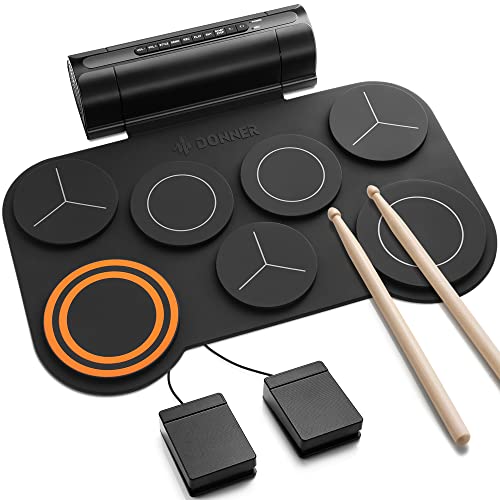Top 6 Musical Instruments For Seniors With Dementia
As an Amazon Associate, I earn from qualifying purchase.
Have you ever noticed how music can make someone’s eyes light up, even when they’re feeling confused? When you’re taking care of someone with dementia, you might find that certain musical instruments can bring them comfort and happiness. Today, I want to tell you about six simple but powerful instruments that can really brighten their day. Let’s see how these instruments can help them feel better and more connected.
Here Are the Best Musical Instruments For Seniors With Dementia
1. Donner Electronic Drum Set
The Donner Electronic Drum Set is a great choice for seniors with dementia who enjoy music. It sounds really good and is well-made, like the ded-100 drum set, but it’s not as sensitive to touch. It looks nice too, which makes it even more appealing.
One of the best things about it is that you can do drum rolls on each pad. This means you can play different rhythms and make all sorts of sounds, which is really fun. It’s perfect for keeping you entertained, whether you’re at home or traveling.
Overall, it’s a good investment if you want to have some musical fun and keep your mind active.
2. EastRock Tambourine
The EastRock Tambourine is a great pick for seniors with dementia. Its grip feels nice in your hand, and it’s really sturdy. This makes it easy for you to enjoy making music without any trouble. The tambourine makes really good sounds, which makes playing along with songs or music even more fun. Its design is better than most tambourines, so it’s a top choice if you want a fun and engaging musical activity.
3. Meinl Percussion Jam Cajon Box Drum
The Meinl Percussion Jam Cajon Box Drum is a great option for seniors with dementia who want to enjoy making music. It has a nice, loud sound that goes well with acoustic guitar music, and it doesn’t cost too much. Plus, it’s built strong and steady, so you can sit comfortably while you play. And the built-in snare drum adds some extra fun to playing it, letting you be more creative with your music.
4. First Note FN75 Musical Washboard
The First Note FN75 Musical Washboard can be a really helpful thing for seniors with dementia. It’s not too big, so it’s easy to handle, and it makes a nice sound. Although it might not have a lot of different sounds, it’s strong and won’t break easily. All in all, it’s a good choice for music time with seniors because it’s good quality and does the job well.
5. Percussion Maracas Pair of Shakers Rattles
These Percussion Maracas make a louder noise than smaller ones, so you can hear them even when there’s other music playing. They’re built well and look nice, but some people say the sound quality isn’t great, especially with low tones. Still, they work well in places like churches, so they could be useful for more than just playing around.
6. Latin Percussion LP Twist Shaker
The Latin Percussion LP Twist Shaker is a great instrument for seniors with dementia. It’s strong and can last a long time. Plus, it’s easy to hold because of its special design. You can even split it in two, giving you more ways to use it and different sounds to enjoy. The shaker sounds really good, and you can adjust how loud it is. You can also use each part separately, which makes it even more useful. For example, you can shake it gently for a softer sound or shake it harder for a louder one.
Frequently Asked Questions (FAQs)
Musical instruments can stimulate various parts of the brain, promoting cognitive function and memory recall. They offer a form of self-expression, reduce stress and anxiety, and can enhance mood and social interaction, ultimately improving overall quality of life for seniors with dementia.
While the benefits generally outweigh the risks, it’s important to consider potential frustration or confusion that may arise if the instrument is too complex. Additionally, there could be physical risks if the instrument is heavy or has sharp edges. Supervision and appropriate instrument selection can mitigate these risks.
Yes, numerous studies have demonstrated the positive impact of music therapy on individuals with dementia. Research indicates improvements in mood, behavior, cognitive function, and socialization among participants engaged in music-based activities.
Yes, there are various alternatives such as simple percussion instruments like shakers or tambourines, electronic keyboards with pre-programmed melodies, or even interactive digital applications designed for seniors with cognitive impairments.
Look for instruments that are easy to handle, produce clear sounds, and are not overly complicated to operate. Consider the senior’s preferences and abilities, opting for instruments that match their interests and cognitive level. Durability and safety features should also be taken into account.
The lifespan of a musical instrument can vary depending on factors such as build quality, frequency of use, and maintenance. Generally, well-maintained instruments can last for several years. However, it’s important to regularly inspect and replace instruments that show signs of wear or damage.
No, playing musical instruments is unlikely to worsen dementia symptoms. In fact, engaging in musical activities can have positive effects on cognitive function, mood, and overall well-being for seniors with dementia.
Incorporating musical instruments into daily routines, group activities, or individualized therapy sessions can provide opportunities for cognitive stimulation, emotional expression, and social engagement. Work with caregivers and medical doctors to develop a personalized care plan that integrates music-based interventions effectively.
Final Word

Thanks for taking the time to explore these musical instruments with me. Remember, the power of music knows no bounds, and it can bring a ray of sunshine into the lives of our seniors with dementia. Until next time, keep spreading joy through the magic of music.







